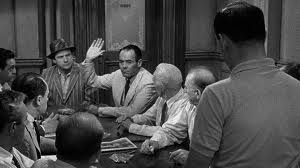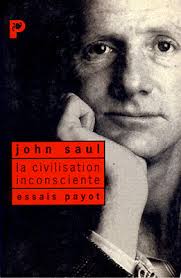I’ve been studying and writing about this book off and on for months, and today I’ve finished. My first look at The Unconscious Civilization (and its author, John Ralston Saul) was here, and the summaries of the first four chapters are also linkable (and brief):
II “From Propaganda to Language”
III “From Corporatism to Democracy”
IV “From Managers and Speculators to Growth”
The final instalment of the 1995 Massey Lectures series by the notable Canadian writer/activist John Ralston Saul was titled “From Ideology to Equilibrium”. All were published in book form later that same year, and it’s a measure of the enduring value and bold vision of the book that a tenth-anniversary reissue came; I wouldn’t be surprised to see another edition come out next year for the 20th. (His 2004 The Collapse of Globalism came out again in ’09, with some extra commentary in the wake of the 2008 economic crisis that he had predicted.) In this lecture/chapter, Saul advances and finally summarizes his argument; these thoughts also point towards his later book, On Equilibrium. He doesn’t believe in air-tight utopian dreams, but in the same way that Socrates advocated a lively but humble journey “towards knowledge without the expectation of finding [absolute] truth”, Saul describes his philosophy on genuine societal progress this way: “Practical humanism is the voyage towards equilibrium without the expectation of actually arriving there.”
Here is my attempt at summarizing the potent concluding essay, “From Ideology to Equilibrium”, in 500 words:
- Shun utopias, simplistic formulas. What counts are citizens’ daily efforts to be conscious, responsible (not passive) and sympathetic (no “self-loathing and cynicism” about people’s motivations). Adam Smith insisted on these, not the heartless “efficiencies” of market capitalism made in his name.
- Ideology makes us fear time and encourages haste. Without time for reflection, “panicked, we flee towards certainty”. Ironically, with increased life spans, “individuals have never had so much time”. Why front-end load our lives, with long and unproductive retirements? Because corporatism rushes “to use machinery – inanimate or human – …before they suffer any depreciation”. Waste.
- Leftists treat human rights as “unrelated to the…public good”. The Right invokes obligation toward “certain absolute needs of society”, and to help ourselves. Both err in seeing individualism not as enlightened citizenship but as “self-absorption”. Leftists conceive rights being won back from society; Rightists’ love for duty degrades into blind obedience to it.
- The Left is hampered by elitism and “fear of the citizen”, that the masses would undo efforts to free them. By 1995, even social democratic governments endorsed market ideologies, including education that “prepare[s] the young to accept the structures of corporatism”; i.e. job training.
- Rights protect us from society, but are meaningless unless we also contribute to and criticize it. “Real individualism…is the obligation to act as a citizen…, the refusal to mind your own business.” This is difficult.
- “False individualism” is a smoother path: “Clothes, holidays, sports, multiple marriages and orgasms, face and other lifts can be agreeable diversions on life’s tiring road”. Our leading citizenry “adopts public silence and private passivity…[and] walks away from society to blow off steam on private pleasures”.
- The jury system is one “mechanism of equilibrium”; the combination of the 12

Henry Fonda expresses his doubt in “12 Angry Men”. A jury with no women, but citizens engage and justice emerges.
results in disinterested service to the society. Avenues of “public debate [that] duplicate the conscious understanding of the jury” must be built into societal structures.
- Language hinders us. Few join complex social arguments, whereas slogans and utopian symbols – e.g. the American small-town ideal, promoted by the same cynics who destroy it via best-price global capitalism – are easily digested. Only through a “rebirth or rediscovery of meaning” and plentiful social discourse can our malaise be solved.
- Deconstructionism “attacks our addiction to [simple] answers”, but “undermine[s] the validity of our questions”. Obscure philosophies aren’t the way to renew public discussion; citizen engagement is. Middle Ages scholars descended into “a perpetual process of marginalia [which] required intelligence but…did not require thought”. Today, “intellectual splintering” and the growing corporatism of universities echo this.
- Universities must insist on training minds, instead of producing “21-year-old

“Lots of debt and I don’t know much, but look at these crazy hats!” Cynical, yes, but Saul is tough on the Academy.
specialists equipped with no memory of their civilization’s experience”. Why not take 5-10 of the retirement years and flip them to the beginning of adulthood, giving more time for deeper learning and societal service? Education is an economic asset, not a liability!
- No systemic tweaks: remove private financing from the electoral process, forge global agreements on social policy and money market regulation, and be unafraid to control technological development. Are we “willing to sacrifice our civilization in the name of the abstract demigod of inanimate objects”?
- What is civilization? “Most of what we reward works against the public good, and most of what we discourage or punish would work in its favour”. What leads to citizen consciousness, societal equilibrium? Classical Greece, traditional Christianity, Aquinas, Augustine, Adam Smith, Thomas Merton: all suggested cardinal human virtues, usually in sacred threes. Saul suggests six: COMMON SENSE; CREATIVITY; ETHICS; INTUITION; MEMORY; REASON.
- They can’t be rigidly defined; they must be known practically, by their use or misuse. In balance, “they are our weapons…[in] a constant war against ideology,…the filters of public action”. In isolation they are tools of ideology; together, they express the “balanced individualism” that can build societal equilibrium.
Again, mea culpa: I’ve had neither the time nor the heart to whittle Saul’s last chapter down to the 500 words I promised at the start of this project. (620 isn’t bad; textual casualties are bleeding all over my desk as it is.) Near the end of this last chapter, “From Ideology Towards Equilibrium”, he summarizes the book’s argument this way:
What I have described in these five chapters is a civilization – our civilization – locked in the grip of an ideology – corporatism. An ideology that denies and undermines the legitimacy of the individual as the citizen in a democracy. The particular imbalance of this ideology leads to a worship of self-interest and a denial of the public good. The quality that corporatism claims as its own is rationality. The practical effects on the individual are passivity and conformism in the areas that matter and non-conformism in the areas that don’t.
The emphasis above is mine, though here Saul is quoting himself from earlier in The Unconscious Civilization. It is a brilliant and disturbingly accurate description of what our popular culture construes as “individualism”, a way of thinking and living that is banal at best, and deeply demoralizing at its potential worst.
Well. I have done. Will you read the book? Obviously, I recommend it, and my summaries did more for my thinking than your understanding, I’m sure. If you’ve read this far, count yourself at least semi-conscious, and thanks, and congratulations.


